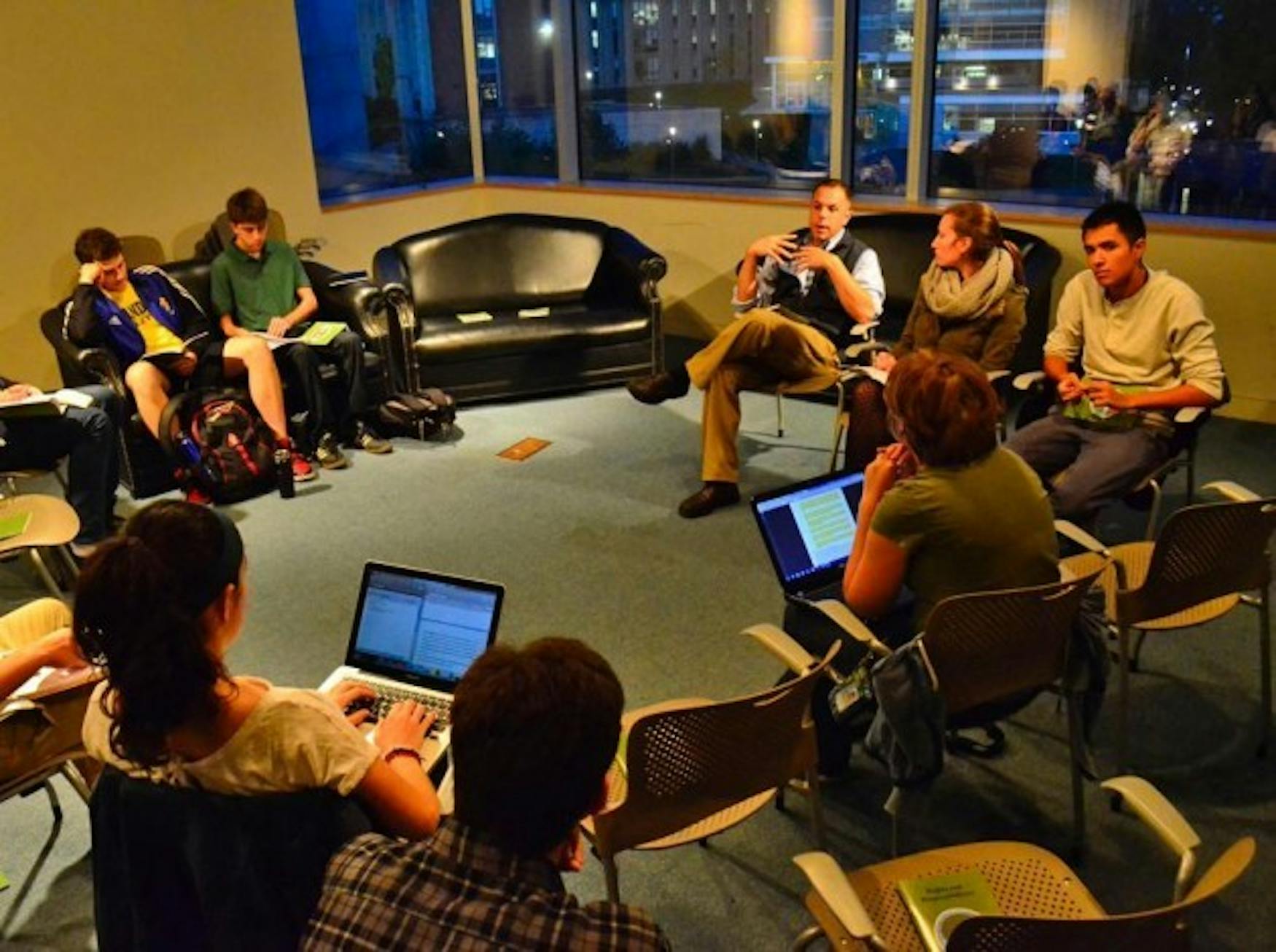Dept of Student Rights answers policy questions
This year's edition of Brandeis' "Rights and Responsibilities" was published by the Department of Student Rights and Community Standards with some big additions. Specifically, the "Student Conduct Process Code" gained a special focus on situations dealing with sexual harassment, and a new process called the "Special Examiner's Process" was dedicated to that topic. To elaborate on the details of the new process and to clarify the language used in the new handbook, the Student Conduct Board held a public forum in the Shapiro Campus Center's Art Gallery last Thursday.
The discussion lasted for about an hour. About 15 students attended, representing various clubs and student organizations.
The forum, led by Student Rights and Community Standards Director Dean Gendron and Student Conduct Board member Rachel Usnik '13, was designed to address any concerns or confusion students had about the "Special Examiner's Process" through a series of questions directed toward Gendron. Major student groups represented at the forum included Young Americans for Liberty and the Feminist Majority Leadership Alliance.
Dean of Student Life Rick Sawyer was also present in case questions with complicated answers needed further elaboration.
According to the current "R&R," the "Special Examiner's Process" involves "cases where the [Department of Student Rights and Community Standards] determines that one or more possible violations of Section 3 (Sexual Responsibility) or Section 7 (Equal Opportunity, Non-Discrimination, and Harassment) exist." The section in the handbook further describes the process as one in which a "Special Examiner" (as opposed to a board of faculty and Student Conduct Board members) appointed by Sawyer performs an investigation after the DSRCS receives a Community Standards Report and judges the case as violating one of the aforementioned sections.
The Special Examiner's investigation consists of interviewing both the accuser and the accused with an observer present, examining any evidence provided and conducting interviews with other persons of interest such as witnesses. The Examiner reports directly to Sawyer, in conjunction with Gendron. Sawyer makes the final decision on the validity and seriousness of the violation. As opposed to the former examination process that was handled by Sawyer and a faculty and student board, the SEP only involves deliberation between Sawyer and the examiner.
Various concerns with the SEP were brought up. A question as to the respect given towards the accuser's confidentiality began the discussion, and issues such as preventing a fraudulent CSR and the specifics of hiring an Examiner, such as how the Examiners are related to the Brandeis community and their training process, also came up. Gendron gave equal time for each question and their follow-ups.
He assured the representative from FMLA, who did not wish to be identified, that every step would still be taken to assure that the accuser in a SEP case would be comfortable and safe, but also explained that CSR reports are not confidential to the accused, as in accordance with a new federal advisement document called the "Dear Colleague Letter," the accused party now has a right to know their accuser.
As to the process of hiring an examiner, Gendron said that all Examiners are people with a real understanding of campus life, and would most likely be a part of the Brandeis community, such as a psychiatric counselor or member of the DSRCS. Examiners brought in from off-campus will always be persons with multiple years of experience dealing with sexual assault in colleges and universities, as well as psychiatry in relation to the subject. Also, they are required to go through a training process with the DSRCS so they are acclimated to the atmosphere at Brandeis and its community. All Examiners work alone as to prevent bias.
The final topic of the evening was the clarification of the language used in the "Rights and Responsibilities" book itself. YAL Brandeis Chapter President Aaron Fried '14 expressed his concern that including vague language within the handbook could be harmful to free speech on campus and allow too wide a definition of "sexual harassment," and thus possibly make way for unfair bias in cases. Fried urged Gendron to possibly edit the code language to be much more specific and clear about the University's definition of sexual harassment. Gendron agreed and explained that the Process was still an experiment, so issues such as Fried's had plenty of time to be addressed and changes made.
The date of the next forum on the current "Rights and Responsibilities" will be announced soon. Until then, more information can be found by contacting Gendron or Sawyer, looking on the Brandeis website in the DSRCS section, and reading the handbook itself, which can be found online.
Editor's note: Aaron Fried is a Justice columnist.



Please note All comments are eligible for publication in The Justice.